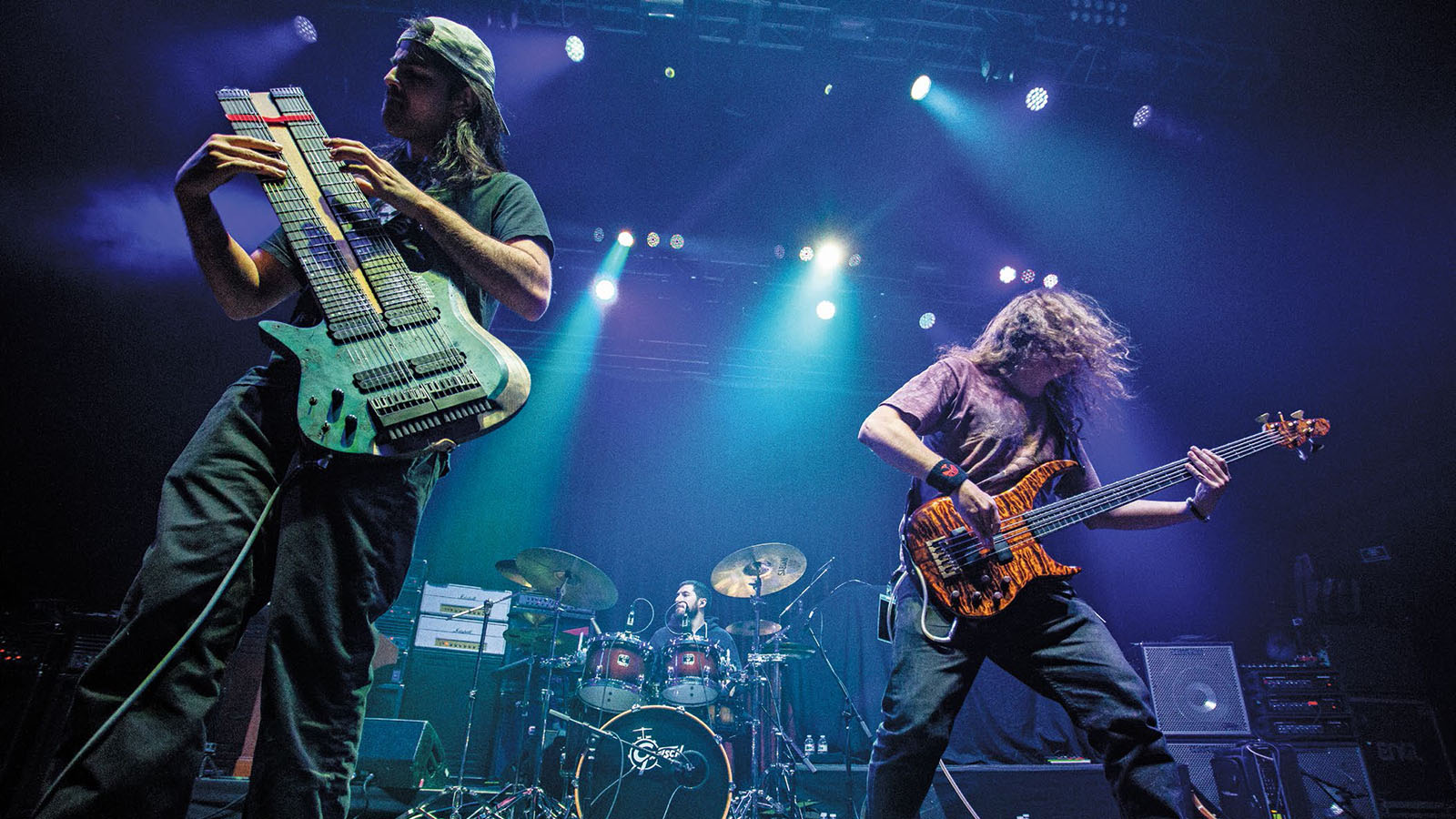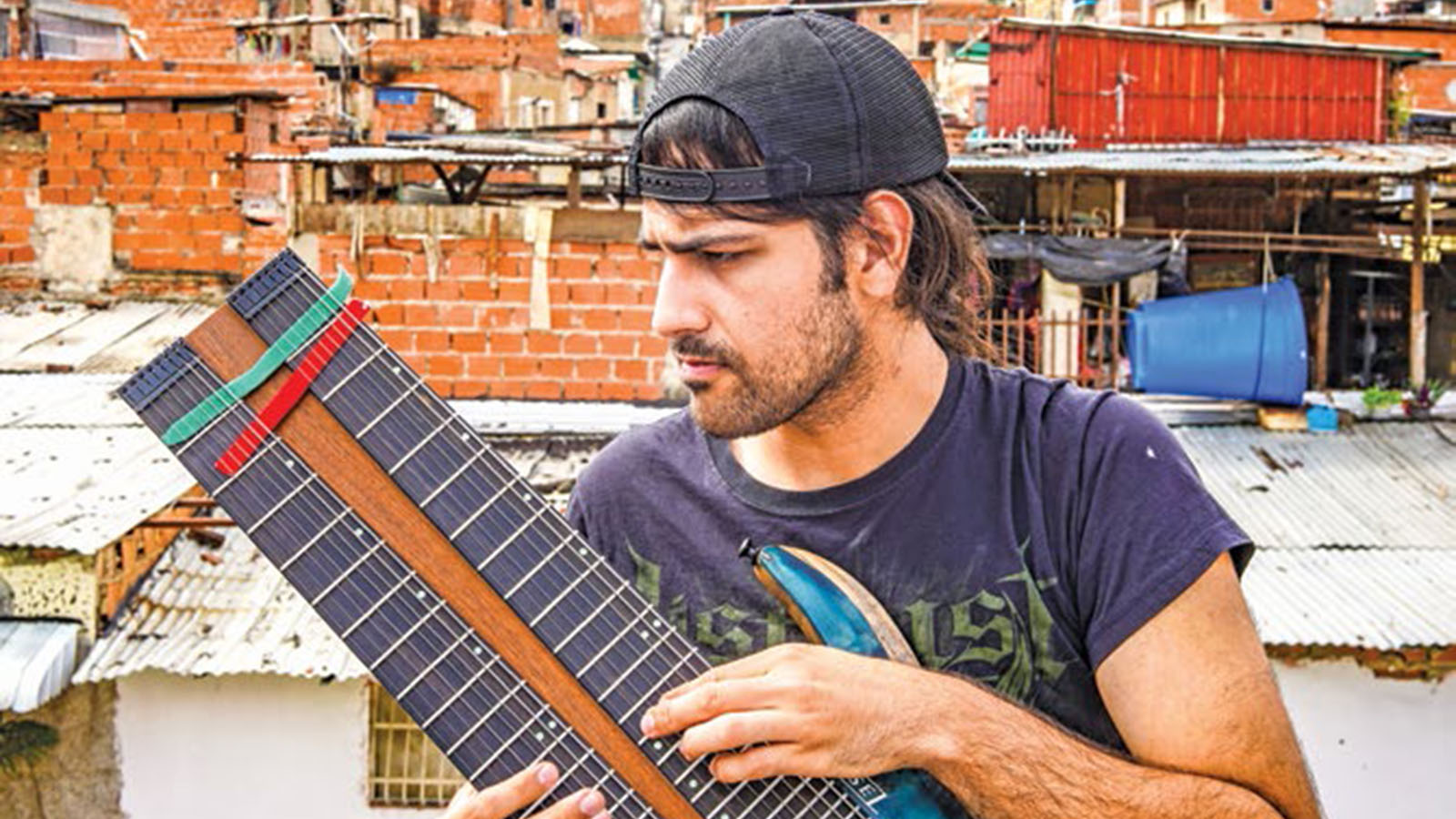Double-neck tapping virtuoso Felix Martin: "A lot of Venezuelan music can mix well with progressive metal and fusion"
The Berklee-trained musician tells Guitar World about his mind-boggling 14- and 16-string guitars and his latest album, Caracas

With its penchant for marrying Latin rhythms with progressive-metal dexterity, Venezuelan-born tapping electric guitar virtuoso Felix Martin’s latest album, Caracas, comes across as a loving homage to his home country.
However, beyond integrating Venezuelan folk textures into the guitarist’s explosive, double-fretboard exploring technique, the collection also is dedicated to the millions of people he marched alongside in the South American country’s capital during the spring of 2017.
“There were huge protests, people dying every day - the country was paralyzed,” he recalls, alluding to the violence the grassroots Resistencia faced during clashes with a militarized state force.
“I spent a week protesting in Caracas, smelling gas bombs and watching my friends get hurt and go to jail. It was really bad. I had to leave Venezuela because I had a U.S. tour, but I felt really bad, like, ‘Man, I’m leaving my people here fighting, all my family’… I felt like I had to do something.”
I owe everything to the place I grew up in. I have to defend it, you know?
After returning to his current home in Los Angeles, he edited together a video for Eight Moon Headdress, off his 2017 collection Mechanical Nations, to show his fans, if not the world, images of protestors squaring off against a brutal National Guard.
Next, he decided to reinterpret songs he first heard while growing up in the town of Acarigua, 215 miles southwest of Caracas, in an effort to use his talents to help “inspire my people.” The result is Caracas, an especially ambitious 12-song instrumental effort that showcases Martin’s talents on record like never before.
Take the jaw-dropping interpretation of Venezuelan folk standard Quitapesares, where Martin uses his custom double eight-string to furiously tap out power chords above a jumpy, Joropo-style 6/8 backbeat, run wild with some choppy scale work, and then level the plains with a devilishly doomy, djent-influenced stomp mosh outro.
Get The Pick Newsletter
All the latest guitar news, interviews, lessons, reviews, deals and more, direct to your inbox!
I grew up listening to Venezuelan music – I wanted to pay tribute to it
“That’s the music I grew up listening to and playing,” he says of Caracas’ pronounced Latin feel. “I wanted to pay tribute to that music, but I also feel that a lot of Venezuelan music can mix well with progressive metal and fusion.”
Mind you, merging these styles isn’t an entirely new concept for the artist. While Martin is Berklee-trained, he started off as a self-taught player attempting to find common ground between traditional tangos, classical guitar pieces and Steve Vai.
Caracas tracks like Zumba Que Zumba reflect this melting pot of influences, with blistering sweeps blissfully co-existing alongside the percussive complexity of South American rhythms.

“That little shred solo in there, it’s a cool technique I do,” Martin says. “I actually play one arpeggio per hand - it’s a minor 7 [on one hand] and then a minor 7 flat 5 on the other one. You play them together and you get this scale. That’s why it sounds precise. It’s actually not that fast, because I’m helping [it along] with both hands. I mean, I wanted to make Latin shred.”
Further evolving Martin’s skill set, Caracas is the guitarist’s first album to employ a recently acquired 14-string custom acoustic guitar by Canada’s Laplante Guitars, which is heard prominently on feisty, tapped-and-slapped pieces like Caballo Viejo and Grey Zuliana.
“I think it brings a new sound to the acoustic community,” he says, before admitting there’s been a learning curve to adapting his ambidextrous tapping style to an unplugged instrument.
“Some tapping techniques do sound different,” he says. “The most challenging thing for me on the acoustic is [how] to record it, and [how] to play live. I play pretty much all tapping on the acoustic guitar and some percussion on the neck. Sometimes it’s hard to get notes out of it; I guess that’s the most challenging thing, in terms of sound. But playability? It isn’t a problem - the action is low, so I can play the same things.”
While Martin will be taking the sounds of his fifth studio release through venues across the globe, he’s also ready to get back to Venezuela for more personal reasons. His homeland was embroiled in a presidential crisis throughout 2019, with President-elect Juan Guaidó battling for power with President Nicolás Maduro, who has yet to officially relinquish his position.
Protests against the latter continue nationwide. Martin offers up Caracas as a soundtrack for hope and a temporary stand-in until he can get back on the frontlines. “I owe everything to the place I grew up in. I have to defend it, you know?”
Felix's gear
Guitars
- Custom Kiesel 16-string (double eight-string)
- Custom Laplante Guitars 14-string acoustic
Amps
- Line 6 Helix direct to PA
Effects
- EarthQuaker Avalanche Run
Gregory Adams is a Vancouver-based arts reporter. From metal legends to emerging pop icons to the best of the basement circuit, he’s interviewed musicians across countless genres for nearly two decades, most recently with Guitar World, Bass Player, Revolver, and more – as well as through his independent newsletter, Gut Feeling. This all still blows his mind. He’s a guitar player, generally bouncing hardcore riffs off his ’52 Tele reissue and a dinged-up SG.
“I just learned them from the records. I don’t read tabs or anything, I don’t read music – I learned by ear”: How a teenage Muireann Bradley put a cover of Blind Blake’s Police Dog Blues on YouTube and became a standard bearer for country blues
“The Strat was about as ‘out’ as you could get. If you didn’t have a Floyd Rose, it was like, ‘what are you doing?’”: In the eye of the Superstrat hurricane, Yngwie Malmsteen stayed true to the original











